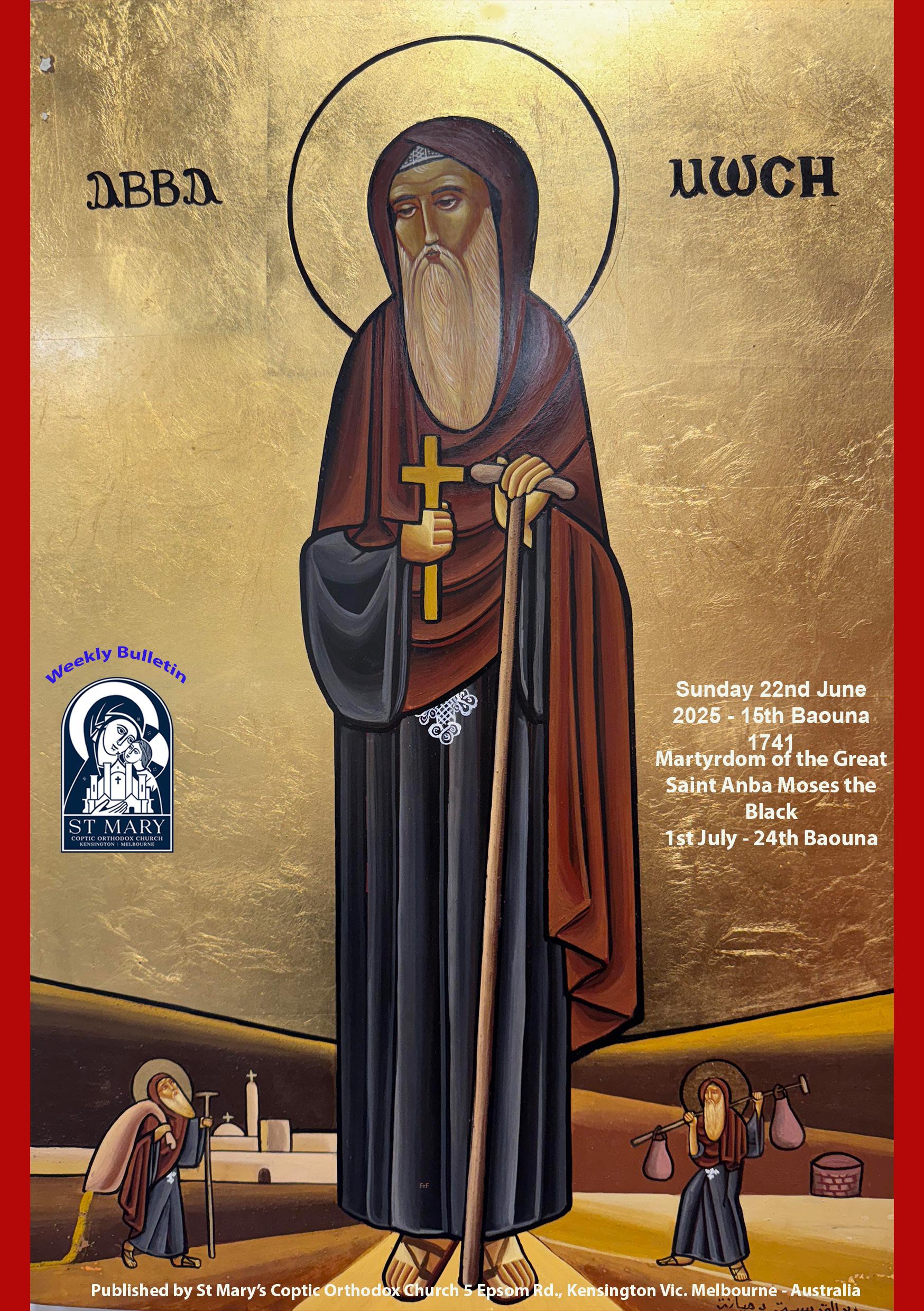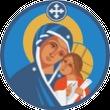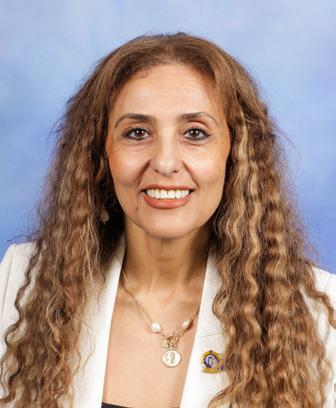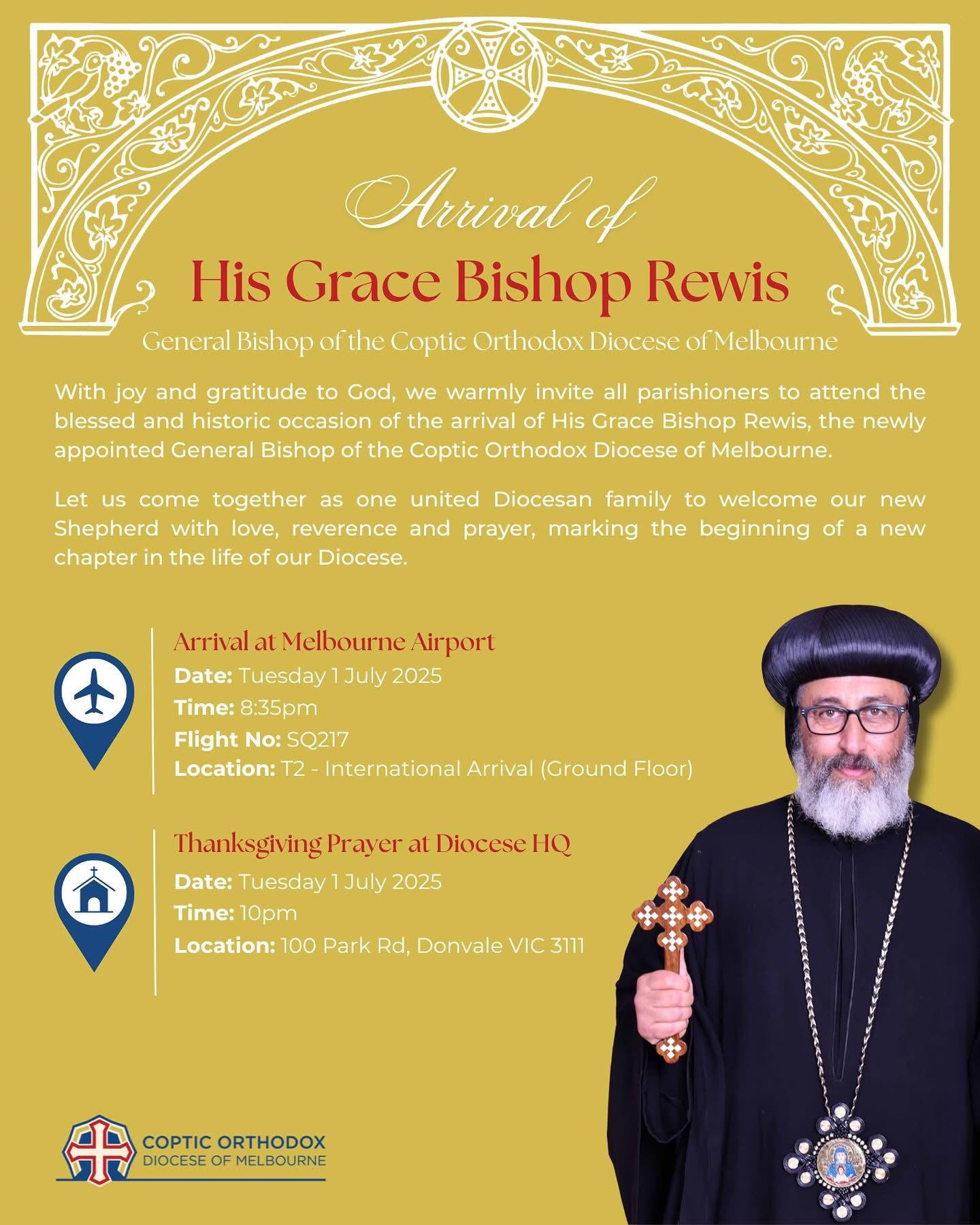
Services at St Mary’s Church
Monday:
Mass 8:30 - 11 AM
Tuesday
Liturgy 5:30 – 7 AM
The Way Orthodox Fellowship in English for adults - All ages 7:30 PM
Wednesday:
Mass 8:30 – 11 AM
Hymns class for adults 7 – 8:30 PM
English Bible Study 7:30 PM
Thursday
Mass 8:30 - 11 AM
English Midnight Praises 7:30 PM
Friday:
Mass 8:30 – 11 AM
Youth meeting 25 and above 7-9 PM
Discipleship Class 7-8:30 PM
Saturday:
Mass: 8:30 – 11 AM
Scouts 1:30 – 3 PM
Choirs and Theatre 2 – 4 PM
Vespers Praises 2:45 – 4 PM
Sunday School for grades 7-10 4 – 6:30 PM
Sunday School for primary 4:30 – 6 PM
Vespers & youth meeting 7-8:30pm English
Vespers &Bible Study Arabic 6-7:30 PM
Midnight Praises 7:30 – 9:30 PM
Sunday:
1st Mass 6:30 - 8:30 Arabic & English
2nd Mass.8:30 - 10:30 English - St Mary’s
Church
3rd Mass 8:30 - 10:30 Arabic - St John’s Chrysostom
Psalmist School of Hymnology 11:15 AM –12:15 PM
Church Priests:
Fr Tadros Sharobeam 0414251251
Email: frtadros@me.com
Fr Habib Girgis Younan: 0401238177 – 94498871
Email: habibgirgisyounan@hotmail.com
Fr Michael Salib: 0422431821
Email: frmichael@sac.edu.au
Fr Kyrillos Tawadros 0411 518 399
Fr John Makary 0433 445 636
Church Address: 5 Epsom Rd., Kensington Vic
3031 Tel: 93766651
Martyrdom of the Great Saint Anba Moses the Black
1st July - 24th Baouna
On this day, St. Moses the Black, whose life story is remarkable, was martyred. This saint took the Kingdom of Heaven by force, exactly as our Lord Jesus Christ said: The Kingdom of Heaven suffers violence, and the violent take it by force. (Matthew 11:12). In his early life, St. Moses was a slave to people who worshiped the sun. He was a mighty man who loved to eat and drink excessively. He killed, robbed and committed all evil. No one could stand up before him, or challenge him. On many occasions, he lifted up his eyes to look to the sun and to talk to it saying, O Sun!! if you are God, let me know it. Then he said, And you O God whom I do not know, let me know you. One day, he heard someone saying to him, The monks of Wadi El-Natroun know the real God. Go to them and they will tell you. Instantly, he rose up, girded his sword and went to the wilderness of Shiheat. He met St. Esidorous (Isidore) the priest, who was frightened when he saw him, because of his appearance. St. Moses comforted him by saying that he came to the monks so that they might let him know the real God. St. Esidorous took him to St. Macarius the Great, who preached to him, taught him the faith and baptized him. He accepted St. Moses as a monk and taught him to live in the wilderness. St. Moses dashed in many worships, and fought a spiritual fight which was greater than that fought by many saints. However, the devil fought him intensively with his old habits of excessive eating, drinking, and fornication. He informed St. Esidorous about everything which came upon him in his fight with the Enemy. He comforted him and taught him how to overcome the snares of the devil. It was told about him, that when the elders of the Monastery slept, he used to go round to their cells and take their water pots and fill them with water which he brought from a well at a far distance from the monastery. After many years in spiritual struggle, the devil envied him, and struck him with a sore on his foot which made him sick and bed-ridden. When he knew that this was from the devil, he increased in his asceticism and worship, until his body became as a burnt wood. God looked to his patience, healed his illness, and removed all his pains. The blessing of the Lord came upon him. After a while, he became the Father and the spiritual guide of 500 brothers, who elected him to be ordained a priest. When he came before the Patriarch to be ordained, the patriarch wanted to test him by asking the elders, Who brought this black here? Cast him out. He obeyed, and left saying to himself, It is good what they have done to you, O black colored one. The Patriarch, however, called him back and ordained him a priest, and said to him, Moses, all of you now has become white. One day, he went with some elders to St. Macarius the Great, who said to them, I see among you one to whom belong the crown of martyrdom. St. Moses answered him, Probably it is me, for it is written: ‘For all they that take with the sword, shall perish with the sword.’ (Matt. 26:25) After they returned to the monastery, it did not take long until the Barbarians attacked the monastery. He told the brethren, Whoever wants to escape, let him escape. They asked him, And you O father,
why do you not also escape? He replied that he had waited for this day for long time. The Barbarians entered the monastery and killed him with seven other brothers. One of the brethren was hiding, and saw the angel of the Lord, with a crown in his hand standing by and waiting for him. He went out from his hiding place to the Barbarians and he was also martyred.
Beloved Ones, contemplate in the power of repentance, and what it did. It transformed an infidel slave who was a murderer, adulterer and robber into a great Father, teacher, comforter, and priest who wrote rules for the monks, and saint whose name is mentioned on the altar in our prayers.
His Body is located now in the Monastery of El-Baramouse.
May his prayers be with us, and glory be to God forever. Amen.
The Departure of the Great Prophet Joshua Son of Nun. 3rd July - 26th Baouna
On this day, of the year 2570 of the world, the great prophet Joshua Son of Nun, departed. He was born, in the year 2460 of the world, in Egypt (Fifty three years before the deliverance of the people of Israel from the bondage of Pharaoh). He was a disciple and servant to Moses. Moses, after leading the people of Israel out of Egypt with the might of the Divine arm and the extraordinary wonders, brought them to the nearby mount of Sinai. He went up the mount taking with him Joshua, his minister, to receive the commandments. During the war of Israel against Am-a-lek, Joshua was the leader of the soldiers. When Moses chose twelve men to spy out the promised land, one from each tribe, Joshua was one of them. He completed this mission with honesty. He and Caleb alone brought forth the true and accurate information about the promised land. Therefore they alone entered this land without the people of Israel that came out of the land of Egypt. Because they had murmured and doubted in the sincerity of the promises of God, God swore in His anger that they would not enter to His rest. Their children that they begot after their deliverance from Egypt, entered this land along with Joshua and Caleb.
After the death of the great prophet Moses in the year 2553 of the world, the LORD spoke to Joshua the son of Nun saying: “Moses My servant is dead. Now therefore, arise, go over this Jordan, you and all this people, to the land which I am giving to them; the children of Israel. Every place that the sole of your foot will tread upon I have given you, as I said to Moses. From the wilderness and this Lebanon as far as the great river, the River Euphrates, all the land of the Hittites, and to the Great Sea toward the going down of the sun, shall be your territory. No man shall be able to stand before you all the days of your life; as I was with Moses, so I will be with you. I will not leave you nor forsake you. Be strong and of good courage, for to this people you shall divide as an inheritance the land which I swore to their fathers to
give them. Only be strong and very courageous, that you may observe to do according to all the law which Moses My servant commanded you; do not turn from it to the right hand or to the left, that you may prosper wherever you go. This Book of the Law shall not depart from your mouth, but you shall meditate in it day and night, that you may observe to do according to all that is written in it. For then you will make your way prosperous, and then you will have good success.” (Joshua 1:1-8) Joshua’s heart was strengthened and he sent out two men to spy out the land secretly. So they went, and came to the house of a harlot named Rahab, and lodged there. The woman hid them; and they swore to spare her and all her household. Then she let them down by a rope through the window, for her house was on the city wall. (Joshua 2:1-15) Then Joshua opened (i.e. conquered) Jericho after he had gone around its walls several times and when they shouted with a great shout the great walls of the city fell down. The people went up into the city and killed both man and beast. The two men that had spied out the country, went into Rahab’s house and brought her, her father, her mother, her brethren, and all that she had, out of the camp. Joshua spared their lives as the two spies promised her for she had spared their lives, and hid them. Then they burnt the city, and all that was therein. The gold, and the silver and vessels of brass and iron, were taken to the treasury of the house of the Lord. The Lord was with this righteous man, so he opened many cities, killed many kings, and the nations feared him. Because of the great fear, the inhabitants of Gibeon worked craftily, and went and pretended to be ambassadors. And they took old sacks on their donkeys, old wineskins torn and mended, old and patched sandals on their feet, and old garments on themselves; and all the bread of their provision was dry and moldy. And they went to Joshua, and said to him, “We have come from a far country; now therefore, make a covenant with us.” But the men of Israel said to them, “Perhaps you dwell among us; so how can we make a covenant with you?” They said to them, “From a very far country your servants have come, because of the name of the LORD your God; for we have heard of His fame ... this bread of ours we took hot for our provision from our houses on the day we departed to come to you. But now look, it is dry and moldy ... and these our garments and our sandals have become old because of the very long journey.” Joshua made peace with them, and made a covenant with them to let them live; and the rulers of the congregation swore to them. Three days later, after they had made a covenant with them, they heard that they were their neighbors who dwelt near them. Joshua called for them, and he spoke to them, saying, “Why have you deceived us, saying, ‘We are very far from you,’ when you dwell near us? Now therefore, you are cursed, and none of you shall be freed from being slaves.” Joshua made them woodcutters and
water carriers for the congregation and for the house of the LORD. (Joshua 9:3-27)
Joshua fought with the five Amorite kings, hence the hand of the Lord had helped him by casting down great stones from heaven upon them. The children of Israel fought them before the city of Gibeon, and he made the sun stand still until the five kings and their soldiers were destroyed. Joshua divided the land according to the command of God among the children of Israel. He gave the priests cities to dwell in, and land for their cattle. He set apart five cities of refuge wherein all those who had committed a murder unintentionally might dwell. When he completed about one hundred ten years and reached a good old age, he gathered together the elders of Israel, their heads, their judges and their officers, and commanded them to keep the commandment of the Law and not to deviate from worshipping God, then departed in peace.
May his prayers be with us. Amen.
The Martyrdom of St. Ananias, the Apostle.
4th July - 27th Baouna
On this day, St. Ananias, the apostle, departed. The apostles ordained this saint bishop for the city of Damascus. He preached therein with the life-giving gospel, as he preached also in the city of Beth-Gabriel and converted many of its people to the faith, and baptized them and their children. St. Ananias was the one to baptize the apostle Paul when the Lord sent him to him. When he baptized St. Paul, something like scales fell from his eyes, and he received his sight at once. God wrought many great miracles by his hands; and many of the Jews and Gentiles believed through his preaching. Afterwards, Lucianus the governor seized St. Ananias, and tortured him with sever tortures, such as burning his sides with fiery torches. Finally, Lucianus took him outside the city, and commanded him stoned until St. Ananias delivered up his pure soul in the hand of the Lord. May his prayers be with us. Amen.
The Martyrdom of St. Thomas of Shentalet.
4th July - 27th Baouna
On this day also, St. Thomas of Shentalet(1) (Sandalat) was martyred. Michael, the angel of the Lord, appeared to this Saint when he was twenty-one years old, while he was sleeping in the field tending the pigs. The angel Michael commanded him to go and confess the Lord Christ. St. Thomas went to Alexandria and confessed his faith before the governor who tortured him with different kinds of tortures. There were with him under the torture St. Babnuda, of the city of El-Bandara, and Anba Shenousy(2), from the city of Balkim, and they encouraged each other to endure. After many tortures, the governor sent St. Thomas to Arianus, the governor of Ansena, where he was beheaded and received the crown of martyrdom. There were seven hundred men and nine women martyred during his days. May their prayers be with us and Glory be to God forever. Amen.
Fourth Sunday of the Blessed Month of Paone
Today, Sunday July 29th June 2025 - 22nd Paone 1741 for the martyrs is the fourth Sunday of the blessed month of Paone and today the readings of the Divine Liturgy are:
Pauline: Colossians 4:2-18 “Let your words always be with grace, seasoned with salt, that you may know how you ought to answer each one”.
Catholicon: James 5:9-20, let him know that he who turns a sinner from the error of his way will save a soul from death and cover a multitude of sins.
ACTS: Acts 18:1-11 Do not be afraid, but speak and do not be silent, for I am with you, and no one rises up against you to harm you.
The Holy Gospel: Luke 6:27-38 “But I say to you who hear: Love your enemies
Materialistic life today has made humans become selfish, loves himself very much and strives for himself. In fact, man has culminated himself to the point where he can no longer participate with others in anything. The loss of this spirit has caused the collapse of many social and family ties in these material societies. Rather, people resort to violence, which is a widespread phenomenon, the main cause of which is this person’s feeling of isolation and lack of belonging and that there is no one to love him. How difficult it is to live in an environment that surrounds you with a spirit of challenge, fear and isolation. How difficult is the feeling that you are required to fight in every situation with people and demands to prove your presence in everything you face. A person may succeed in this way, but in the highest degree of his success he finds himself alone sitting on an isolated pinnacle. The meek inherit the earth, they love everyone, and everyone loves them. Perhaps the time came when Joseph the righteous found himself surrounded by enemies. His brothers rejected him and sold him as a slave. He was detested by his master and even became his enemy and threw him in prison. If Joseph was a selfish person who loves himself, these situations would have been enough to turn him into a violent and resentful person against everyone around him, but his loving, meek soul was not affected. We do not hear from him a single word in which he blames his brothers or his master’s wife. All
this injustice was overshadowed by his abundant love for all; that is why everyone loved him, even the prisoners and the jailers. When Joseph became strong and successful who everyone wished to please him, he did not think for a single moment about taking revenge on anyone. He did not take revenge on his brothers, but rather loved them and provided for them in the land of Egypt. We did not hear that he took revenge on the wife of Potiphar. Joseph was successful inside, and external success did not change his loving and meek nature Many become humble at their time of distress, but their violent, arrogant nature appears in their success. A gentle and loving person is not altered by success, position, or distress just like David. The calm and gentle nature of David did not change when he killed a lion and a bear. He did not change when he defeated the mighty Goliath. He was not bloated when the women came out singing to him that he had killed ten thousands, while Saul had killed thousands. The same thing that angered Saul so much and made him lose his mind. When the opportunity for revenge came against Saul, he refused to stretch out his hand and avenge himself, but in humility and love he rebuked Saul for leaving his kingdom to care for a small person in his own eyes Like David. He wept when he heard that Saul and Jonathan died in the war and he did a favour to their children. David loved even his son who went out against him. He commanded his soldiers to be kind to him, and when David heard that his son died he wept bitterly for him.
No wonder that the Lord loved David very much, and said of him that he examined his heart and found it according to the heart of God.. No wonder that David became ancestor to the Lord Jesus according to the flesh. Rather, the Lord rejoices to be called the Son of David in the flesh. Where are the mighty men of the world who led armies and defeated the nations? Where are those who have made a name for themselves through violence and force? The world hardly remembers them. Everyone forgets them, but those who sowed love and peace, their memory rejoices in the hearts of
all, and their traces become a blessing for all generations after them. I read an article about an American researcher who was doing a strange thing. She was searching the seas and sites that were polluted by chemicals, factory wastes and oil leakage Ships. These places from fish had escaped from and life became hopelessly dead. Rather, these places became a source of concern for the residents around them because of the harmful gases that rise from them and the toxins that they emit in drinking and agricultural waters. This researcher has done something amazing; she dived to the bottom of the water in these places and studied the plant life that has been killed by pollution in the depth of the sea. She chose a kind of aquatic plant that are able to suck out toxins and chemicals and planted it again on the floor of the. Within few months, these plants grow and absorbed the toxins, and the fish return. Life returned back to this area again. This researcher alone planted hundreds of acres of the seabed. She brought it back to life again - in a silent and calm manner and at almost negligible costs. What this researcher made was probably better than many war acts which are applauded by many even though it does not create peace and does not solve problems.
Blessed are the peacemakers. The world today is in great need of those who sow love and peace, not in words but in action through the meek and quiet spirit. Many people have their lives full of confrontations and arguments. They will not let things go, but rather confront, proof they are right, and gain more. In reality they lose their inner peace, harmony, and cause exhaustion to those around them. Loving your enemy means negotiating in love and meekness with those who set themselves up as enemies. How many fires are burning in the forests of this world? We are in need of those who know how to put out fires and not experts in making bombs, poisons and explosives. From now on, make a peace plan for your life.
Dear friends, families, and students,

We hope and pray that you are all safe, well and keeping in good spirits.

As we near the end of the first Semester, it brings us great joy to share some truly special news with you. After a careful, thoughtful, and reflective process, we are delighted to announce that Mrs. Germaine Saad, our current Acting Principal, has been appointed as the permanent Principal of St. Mary’s Coptic Orthodox College, effective immediately.
This important decision was not taken lightly. With the help of a highly respected school leadership recruitment agency, we undertook a transparent and rigorous process guided by wisdom, fairness, and a deep sense of responsibility to our students, families, staff and broader community.

The response to the role was incredibly strong, with 10 high-calibre candidates from across the education sector applying for the position. All possessed impressive qualifications, leadership experience, and a genuine interest in our College. Following a thorough pre-selection process, the field was narrowed to five, and then to a final short-list of three outstanding individuals each interviewed in depth, psycho-metrically assessed, and carefully referenced.
Throughout every stage of this process, our focus remained clear: to find a leader who not only brings the right skills and experience, but someone whose heart, values and vision align deeply with our College and its mission.
Among this exceptional group, Germaine stood out clearly and convincingly. Having served St. Mary›s Coptic Orthodox College for nearly two decades, with more than ten years in leadership, Germaine brings knowledge, experience, and an unwavering love for our College, with a deep commitment to its future.
Her steady leadership during her time as Acting Principal, her compassion for every student and family, and her alignment with the College’s strategic direction made this appointment both natural and deeply affirming.
We know the journey ahead will have its challenges, but we move forward with faith and confidence. Germaine’s continuity, vision, and strength of character will help lead us into an exciting new chapter.
Please join us in congratulating and praying for Germaine as she steps formally into this important and blessed role. May God guide her, protect her, and bless her leadership.
Warmest regards,
The Board of St. Mary’s Coptic Orthodox College
19-35 Thorpdale Ave, Coolaroo Vic 3048 PO Box 19, Dallas Vic 3047
T: (03) 9301 0999
E: stmarys@stmarys.vic.edu.au www.stmarys.vic.edu.au
Holy Apostles Fasting
Monday 9th June the Holy Apostles Fasting starts directly after we celebrate the Holy Feast of Pentecost. The Fasting is continuing until 12th July which is the Feast of Martyrdom of St Peter and Paul- the feast of the Holy Apostles. This fasting has been ordered by the Lord Himself when He was asked by the Pharisees why His disciples do not fast as St John’s disciples. The Lord told them that when the Bridegroom is taken from them they will fast. This was pointing to the Resurrection and Ascension of our Lord. The Lord also ordered His disciples not to leave Jerusalem until they are filled with the Holy Spirit. So, the day of Pentecost is truly the day of a start for the new church. The Birthday of the church of New Testament. That is why the church who feels as stranger in this world is carrying the Cross following the Lord. Fasting is also a sign of carrying the Cross in rejection to the world pleasures. We have also witnessed His Resurrection and Ascension and looking forward for His Second Coming. Let us follow the steps of our Lord declaring and witnessing for His Salvation on the Cross on the way to get united with her Bridegroom.
Fr John Macari 636 445 0433
Mrs Mariana Boulos 0437 944 690







